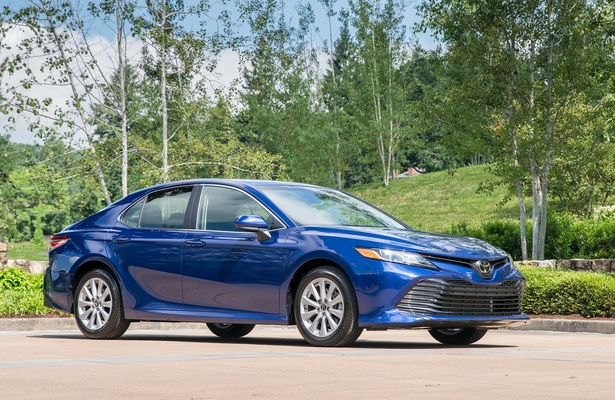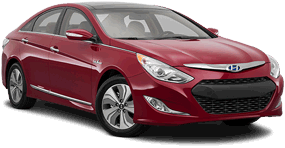Awards and automobiles go hand in hand. We’ve all seen automakers tout the awards their models recently received in order to sell more vehicles. The companies use them to validate claims of how good the cars, crossovers, SUVs, and trucks really are. Chevrolet famously and annoyingly made a big deal of the company's J.D. Power awards in their fairly recent “real people” advertisements. These ads showed people that weren’t actors reacting to the Chevy cars as a presenter discussed the awards.
The ads were ridiculed and derided by many people and never really went into what J.D.Power actually is or why its awards matter. To be fair, Chevrolet isn’t the only automaker to use J.D. Power awards or any of the other awards given out in their advertising. Most automakers use awards and don’t really provide much information about them.
Often, the automakers simply say what award their vehicle won and the publication that gave out the award. Sometimes they don’t even say what the award really is for in their advertising. The automaker will just say something like “a J.D. Power award”, leveraging that company's reputation to improve people’s opinion of the specific vehicle.
The issue is that the specifics of those awards are not widely known, rendering them more or less useless to many customers. People know the names J.D. Power, Consumer Reports, Consumer Digest, Kelley Blue Book, Car and Driver, and Motor Trend, but few car shoppers actually know how the companies evaluate and select cars for their awards.
With the lack of knowledge about these automotive awards, we thought it smart to take a closer look at them to determine how cars are evaluated for the awards. We'll also take a look at why companies give the awards at all, how they're used, and which awards if any, you should pay attention to when shopping for a new car.
Why Publications Give Awards
There are a lot of new vehicles available for purchase. Many of these cars are extremely good at what they do. With so many variables in the make-up of a car, it can be hard to differentiate what’s actually the best car to buy. Ranking or awarding the best cars a certain status can help consumers make the best possible decision when it comes to buying a car.
It can be easy to read two reviews on two different cars and say that they’re both very good. Take the new 2018 Toyota Camry and the 2018 Honda Accord as examples. Both have their merits their downfalls. In order to pick between the two and determine the very best car, a consumer would have to closely read both reviews and then determine from what was said of the cars, which one is actually better. That can take time and with people's ever-shortening attention spans, many people are looking for a clear and concise answer.

Awards from publications streamline this process and make it clear to the consumer which car is the best. By giving the award to the Accord, for example, it’s clear that while the Toyota Camry was still very good in testing, it wasn’t quite as good as Honda's car, or vice versa, depending on the opinion of the award issuing publication.

It’s important to note that many awards are simply the expert opinion of the journalists, editors, or complete editorial team at a specific publication. While some awards are given to vehicles based only on hard data (highest reliability rating), many are simply an expression of the publication’s team’s pick for the best car. You may disagree with their selections, and if you do, that’s fine. That doesn’t make the award fake or false, and it doesn’t mean you’re wrong either.
Usually, a publication tries to use hard data in its reporting to justify and support the selection for what it believes is the best car and deserving of an award. These would be measurable things like 0-60 mph time, EPA mileage numbers, cargo capacity, or towing capacity. Pair that information with ergonomics and the driving experience, and you can get a good overall look at the car and decide if it's worthy of an award. Still, there is an element of opinion involved in most awards, and it’s important to know this when looking at award-winning vehicles.
How Automotive Awards are Used in the Industry

When an automaker receives an award, it uses it as a way to market its vehicle. You’ll see the publication’s award noted in the advertising. The awards are good for the automaker in this way, but they’re also good for the publication giving out the award. When the automaker uses the award in its advertising, it’s also showcasing a specific publication and saying that it’s legitimate. So both sides benefit.
The issue that many people have with automotive awards is that they’re not completely free of bias and not totally free of outside influence. The Wall Street Journal reported on Consumer Digest for selling the rights to advertise its awards to automakers, saying that “many car makers have financial ties to the publication.” WSJ also notes that this isn’t strictly a Consumer Digest practice, and other companies sell advertising licensing to automakers or are influenced in some way.
J.D. Power is one of these. It sells its survey data to automakers for hundreds of thousands of dollars, and then it also charges another fee for the right to use the awards in that company’s advertising, according to Consumer Reports. That doesn’t necessarily mean J.D. Power’s awards are bad. The company uses consumer market research, not just a group of journalists, to evaluate cars, as many other publications do. That means J.D. Power’s awards are based on regular folks who actually own the car. As a result, its awards tend to be accurate.
A Closer Look at Some of the Major Auto Publications That Give Awards
These publications all use different techniques to evaluate and choose awards. Some are more in-depth than others, and it’s important to know the specifics before you fully trust any award-giving entity.
- Consumer Reports
Consumer Reports is a non-profit designed to give unbiased advice to consumers. It buys all its cars from dealers and its editorial team evaluates the models on a variety of criteria. It also surveys subscribers and collects data on hundreds of thousands of vehicles. From there, the publication gives out various awards to vehicles it thinks deserves them. The publication doesn’t seek a fee from automakers and tries to avoid having any corporate input to keep its awards as honest as possible. - Consumers Digest
Consumers Digest is a magazine that is only available in select shops. It has no subscribers or advertisers. Its team of journalists and editors review vehicles based on a number of criteria. From there, the publication essentially picks its favorites. Many other publications take issue with the fact that Consumers Digest sells the advertising rights to the winning automakers. Opponents say it impacts the publication’s choices for its winners. - J.D. Power and Associates
J.D. Power does some of the most extensive automotive market research in the industry. It surveys hundreds of thousands of car buyers each year to put together its reports and awards. The company does sell its data and the rights to advertise its awards to automakers, but because its awards and data are based on actual consumers and not on expert opinion, it’s seen as more reputable than some other publications. - Kelley Blue Book
Kelley Blue Book is a leader in vehicle valuation and car-buying research. Its team evaluates each car itself and then determines the best vehicle for each year. Because the company’s awards often stem from its vehicle valuation data and the fact that the company has been in business and well-respected for decades, the awards are often seen as extremely trustworthy. - U.S. News & World Report
U.S. News & World Report gives out a variety of awards and is known for its in-depth reviews of vehicles. The publication says that its awards are based on top automotive experts from all manner of media, including newspapers, magazines, and automotive websites not just the U.S. News & World Report’s editors’ preferences. The publication also takes into account other awards that certain vehicles have won. This yields a selection that most of the industry can agree on and makes U.S. News & World Report’s awards and rankings pretty accurate. - Car and Driver
Car and Driver is one of the best automotive publications available. Each year, its editorial team evaluates hundreds of cars, crossovers, SUVs, and trucks and then chooses the best and gives out awards. The publication’s 10Best awards are some of the most highly coveted in the industry. - Motor Trend
Motor Trend is another one of the most well-respected automotive magazines out there. Every year, the publication’s team of journalists and editors choose their favorite automobiles. Its “Car of the Year” award has been an important one for decades. Over time, the publication has expanded its list of awards so it can reach all areas of the market.
These are just a few of the publications that give out automotive awards. Just because a publication hasn’t made this list doesn’t mean their awards are pointless or of no use to a consumer.

Many large,
How to Tell Quality Awards from Poor Quality Ones?
The first thing to look for when trying to determine if an award is worth anything is if the publication offers an explanation of their awards process. If they do, read through it and determine for yourself if it’s a good process.
This information should be included with the awards results. If it’s not, try the about page on the publication's website. There may be a link to the award’s methodology there. If you can’t find it there, a simple Google search asking whether or not so-and-so’s awards are legit will probably give you all you need to know.

Last, but not least, look around to see if other automotive publications have a news story sharing the fact that a certain car has won a specific award. If you see numerous publications have shared the information, you can probably assume the award is noteworthy. If you don’t see any mention of the awards anywhere else, there’s a chance that the awards aren’t trustworthy, or simply aren’t that important.
Which Awards Should You Pay Attention To?
When it comes to which are truly the best awards to pay attention to, we’d point you first and foremost to Consumer Reports (Image: Consumer Report). The publication makes the greatest effort to stay objective and keep itself from being influenced by the automakers. Its team of automotive experts do extensive testing and studying of vehicles, and their awards reflect this.
Next, we’d suggest giving some attention to J.D. Power’s awards (photo below: J.D. Power). J.D. Power’s approach means that the company’s awards are based on actual consumer data. This should yield accurate winners. While there are some concerns with how it gives its awards and the fact that the company charges the automakers extremely high fees to be able to use the awards in their advertising, it’s still worth it to take these awards and rankings into account.
After that, we’d say look at some of the best automotive publications out there. Car and Driver, Motor Trend, Kelley Blue Book, and U.S News and World Report all have awards for the best vehicles. As do numerous other publications. U.S. World Report takes into account other major auto publications so its awards are usually a good place to start.
The awards and rankings from several different automotive publications can be helpful in your car search. That said, they shouldn’t be the only thing you use to research potential vehicle purchases. Read reviews and firsthand accounts
How Much Should You Let an Award Impact Your Decision?

With the exception of some of the reliability and quality reports, don’t let awards sway you too much. Consumer Reports and J.D. Power both put out reports for quality and reliability. These are the ones to keep an eye on. That said, just because a vehicle or brand does well in those studies doesn’t mean you should take it as gospel. Do your due diligence and research the vehicle.
Start by getting as much information about those reliability and quality reports. The publications rank cars, but they also give a good bit of information about how the brand has been trending over time. If a brand has slipped in the rankings in several consecutive years, that may be a true indicator of how things are going. The inverse of that is true, too. If a brand or model has surged in recent years, it’s a good indicator of how that automaker is doing in terms of quality and reliability.
Additionally, it’s important to note that copious design changes can impact a car’s quality scores in certain testing, especially if people don’t know how or experience difficulty using the new features. For example, Ford’s Explorer dropped considerably in J.D. Power’s Initial Quality Study in 2011. That change was largely due to design changes or issues. It was not necessarily a fault in the vehicle’s construction. Raffi Festekjian, director of automotive product research for J.D. Power told Car and Driver, “Ford tried to do too much too quickly.” Its initial quality score suffered because of it.
J.D. Power doesn’t publish the survey results in detail, so it can be difficult to know what can cause specific vehicles or brands to jump up or down. If there’s a sudden decline of a specific vehicle, take it with a grain of salt. The same can be said of any other automotive awards. They can be good indicators for you to start your car shopping journey, but don’t assume a highly awarded vehicle will be a perfect machine.


